WTO Negotiations with Serbia and Kazakhstan: Reasons for Delay in Membership
VerifiedAdded on 2023/06/10
|13
|3180
|379
AI Summary
This research proposal discusses the benefits of WTO membership and the reasons behind the prolonged negotiations between Serbia and Kazakhstan that have restrained them from becoming WTO members. The proposal outlines the implications of membership and the factors causing the delay.
Contribute Materials
Your contribution can guide someone’s learning journey. Share your
documents today.
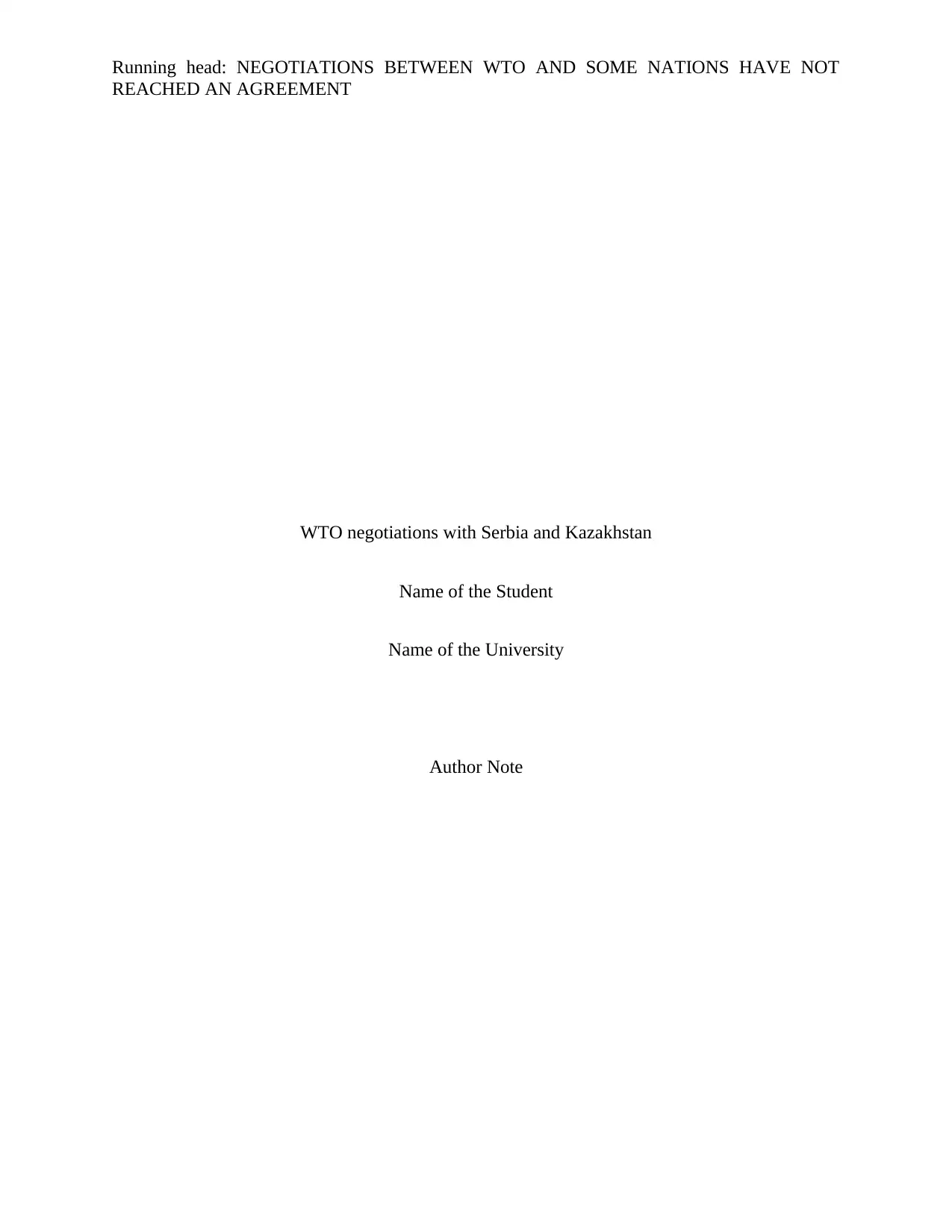
Running head: NEGOTIATIONS BETWEEN WTO AND SOME NATIONS HAVE NOT
REACHED AN AGREEMENT
WTO negotiations with Serbia and Kazakhstan
Name of the Student
Name of the University
Author Note
REACHED AN AGREEMENT
WTO negotiations with Serbia and Kazakhstan
Name of the Student
Name of the University
Author Note
Secure Best Marks with AI Grader
Need help grading? Try our AI Grader for instant feedback on your assignments.
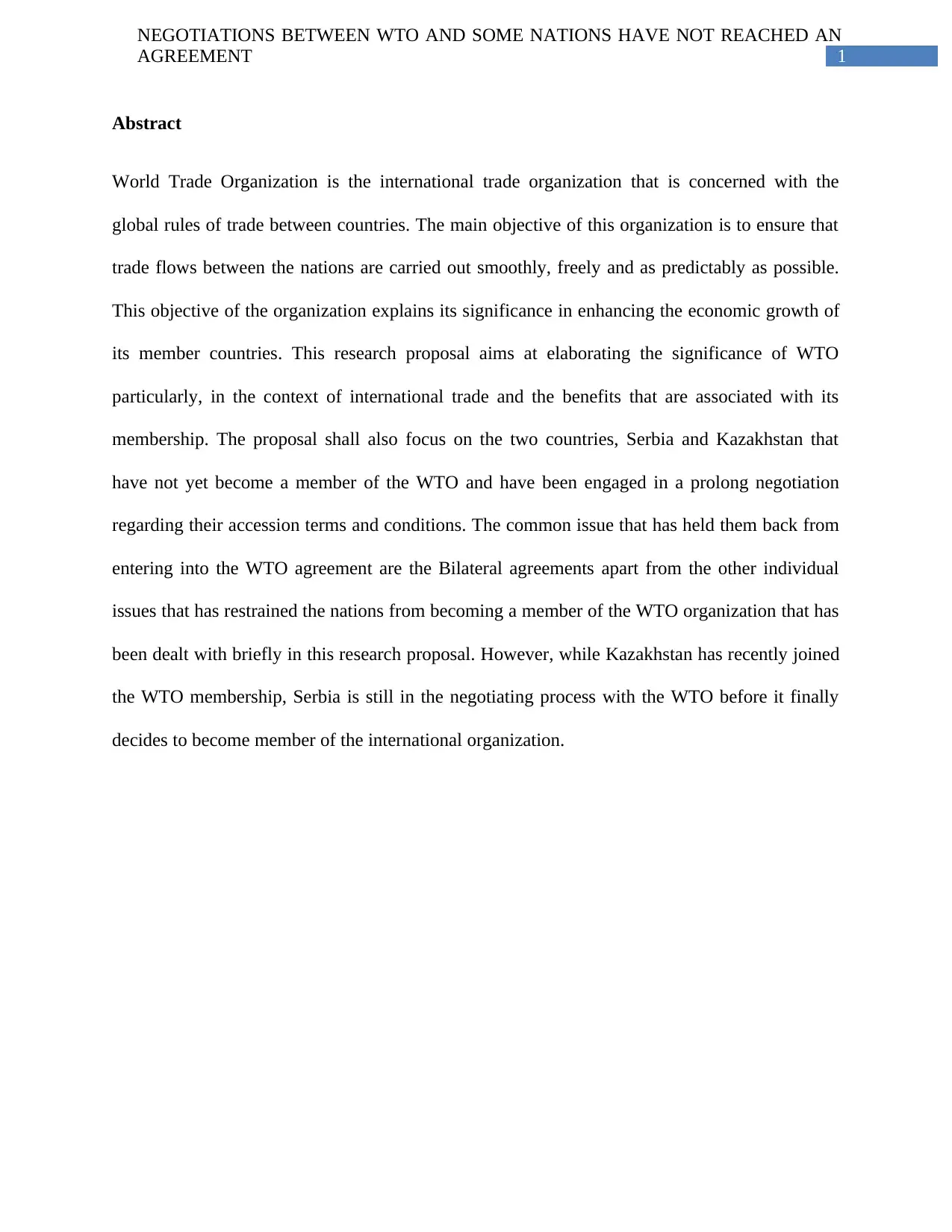
1
NEGOTIATIONS BETWEEN WTO AND SOME NATIONS HAVE NOT REACHED AN
AGREEMENT
Abstract
World Trade Organization is the international trade organization that is concerned with the
global rules of trade between countries. The main objective of this organization is to ensure that
trade flows between the nations are carried out smoothly, freely and as predictably as possible.
This objective of the organization explains its significance in enhancing the economic growth of
its member countries. This research proposal aims at elaborating the significance of WTO
particularly, in the context of international trade and the benefits that are associated with its
membership. The proposal shall also focus on the two countries, Serbia and Kazakhstan that
have not yet become a member of the WTO and have been engaged in a prolong negotiation
regarding their accession terms and conditions. The common issue that has held them back from
entering into the WTO agreement are the Bilateral agreements apart from the other individual
issues that has restrained the nations from becoming a member of the WTO organization that has
been dealt with briefly in this research proposal. However, while Kazakhstan has recently joined
the WTO membership, Serbia is still in the negotiating process with the WTO before it finally
decides to become member of the international organization.
NEGOTIATIONS BETWEEN WTO AND SOME NATIONS HAVE NOT REACHED AN
AGREEMENT
Abstract
World Trade Organization is the international trade organization that is concerned with the
global rules of trade between countries. The main objective of this organization is to ensure that
trade flows between the nations are carried out smoothly, freely and as predictably as possible.
This objective of the organization explains its significance in enhancing the economic growth of
its member countries. This research proposal aims at elaborating the significance of WTO
particularly, in the context of international trade and the benefits that are associated with its
membership. The proposal shall also focus on the two countries, Serbia and Kazakhstan that
have not yet become a member of the WTO and have been engaged in a prolong negotiation
regarding their accession terms and conditions. The common issue that has held them back from
entering into the WTO agreement are the Bilateral agreements apart from the other individual
issues that has restrained the nations from becoming a member of the WTO organization that has
been dealt with briefly in this research proposal. However, while Kazakhstan has recently joined
the WTO membership, Serbia is still in the negotiating process with the WTO before it finally
decides to become member of the international organization.
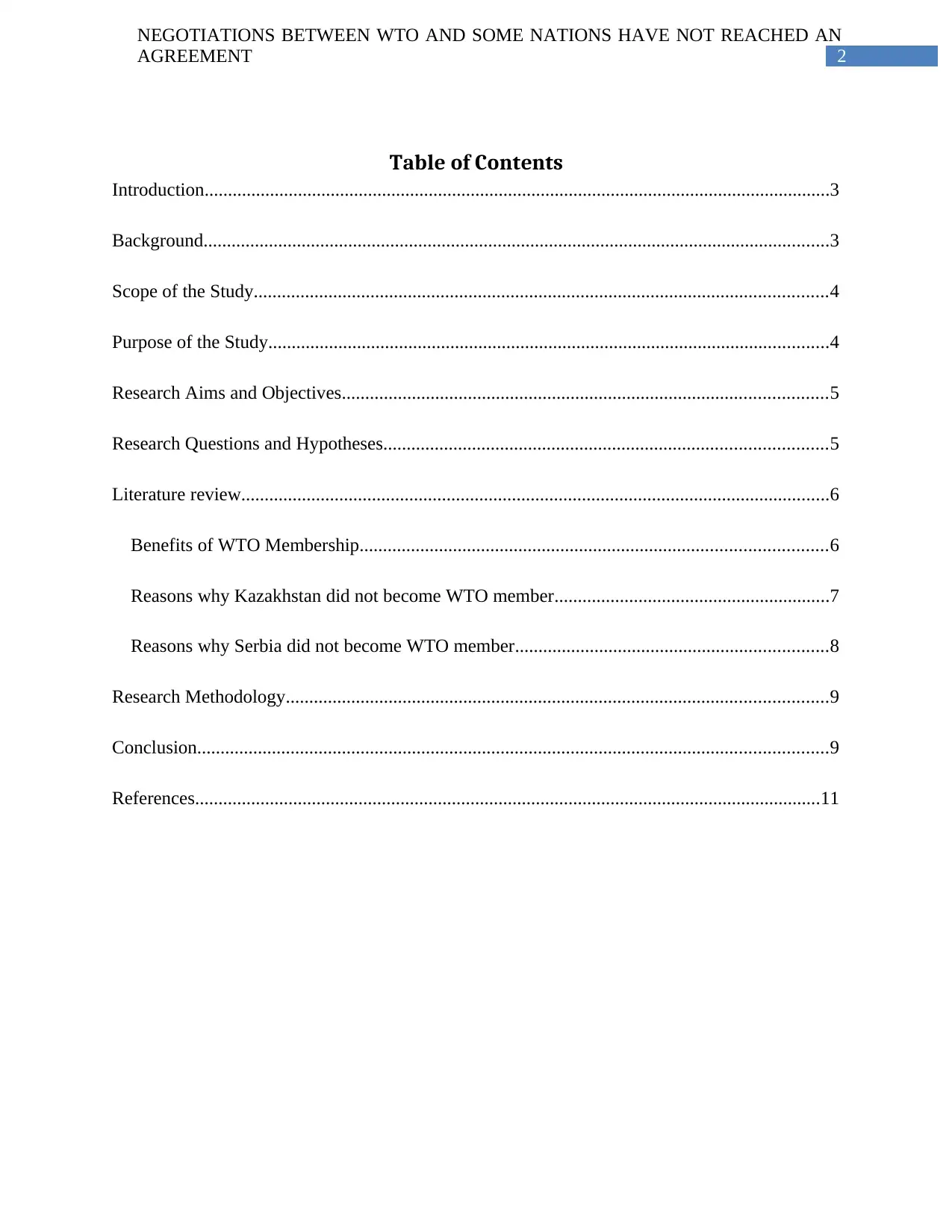
2
NEGOTIATIONS BETWEEN WTO AND SOME NATIONS HAVE NOT REACHED AN
AGREEMENT
Table of Contents
Introduction......................................................................................................................................3
Background......................................................................................................................................3
Scope of the Study...........................................................................................................................4
Purpose of the Study........................................................................................................................4
Research Aims and Objectives........................................................................................................5
Research Questions and Hypotheses...............................................................................................5
Literature review..............................................................................................................................6
Benefits of WTO Membership....................................................................................................6
Reasons why Kazakhstan did not become WTO member...........................................................7
Reasons why Serbia did not become WTO member...................................................................8
Research Methodology....................................................................................................................9
Conclusion.......................................................................................................................................9
References......................................................................................................................................11
NEGOTIATIONS BETWEEN WTO AND SOME NATIONS HAVE NOT REACHED AN
AGREEMENT
Table of Contents
Introduction......................................................................................................................................3
Background......................................................................................................................................3
Scope of the Study...........................................................................................................................4
Purpose of the Study........................................................................................................................4
Research Aims and Objectives........................................................................................................5
Research Questions and Hypotheses...............................................................................................5
Literature review..............................................................................................................................6
Benefits of WTO Membership....................................................................................................6
Reasons why Kazakhstan did not become WTO member...........................................................7
Reasons why Serbia did not become WTO member...................................................................8
Research Methodology....................................................................................................................9
Conclusion.......................................................................................................................................9
References......................................................................................................................................11
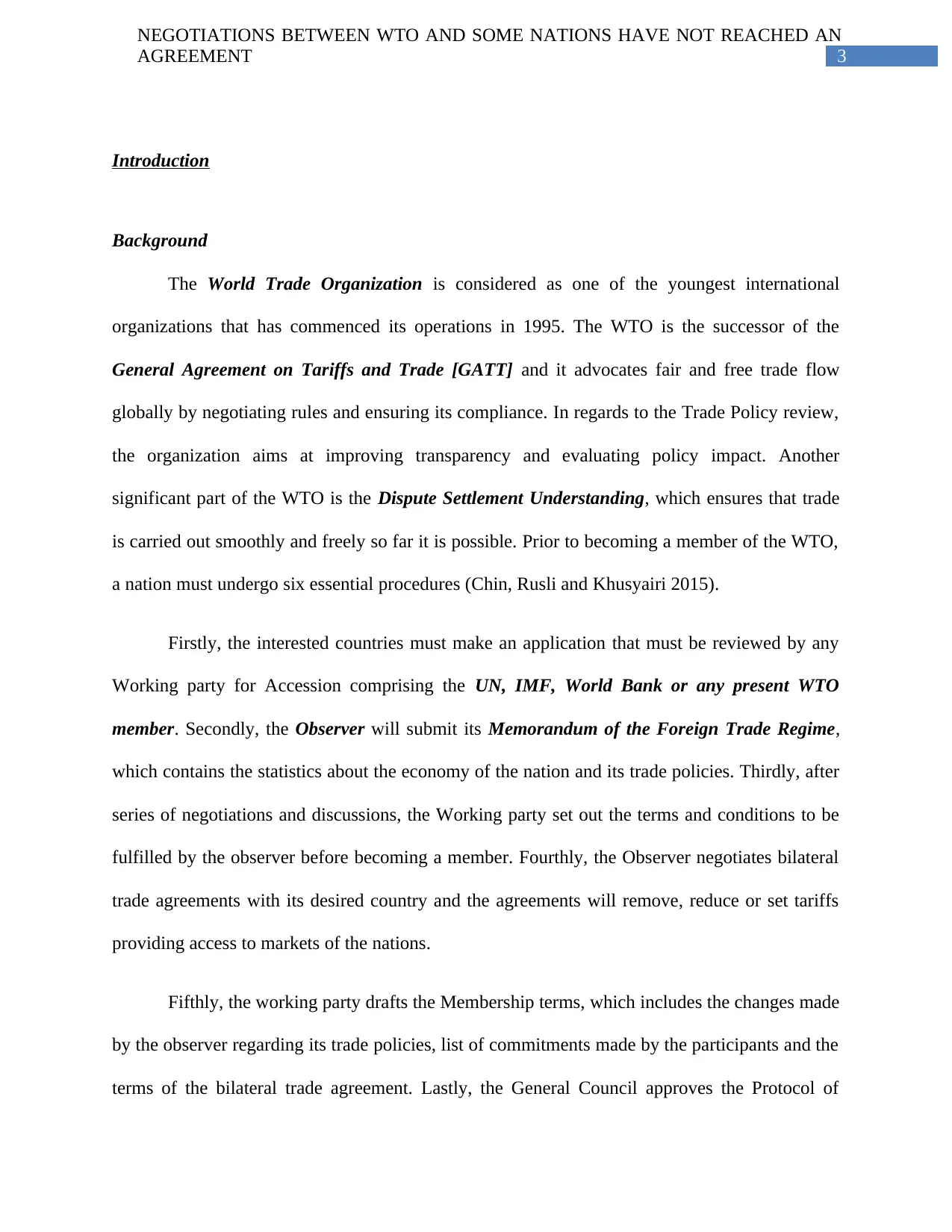
3
NEGOTIATIONS BETWEEN WTO AND SOME NATIONS HAVE NOT REACHED AN
AGREEMENT
Introduction
Background
The World Trade Organization is considered as one of the youngest international
organizations that has commenced its operations in 1995. The WTO is the successor of the
General Agreement on Tariffs and Trade [GATT] and it advocates fair and free trade flow
globally by negotiating rules and ensuring its compliance. In regards to the Trade Policy review,
the organization aims at improving transparency and evaluating policy impact. Another
significant part of the WTO is the Dispute Settlement Understanding, which ensures that trade
is carried out smoothly and freely so far it is possible. Prior to becoming a member of the WTO,
a nation must undergo six essential procedures (Chin, Rusli and Khusyairi 2015).
Firstly, the interested countries must make an application that must be reviewed by any
Working party for Accession comprising the UN, IMF, World Bank or any present WTO
member. Secondly, the Observer will submit its Memorandum of the Foreign Trade Regime,
which contains the statistics about the economy of the nation and its trade policies. Thirdly, after
series of negotiations and discussions, the Working party set out the terms and conditions to be
fulfilled by the observer before becoming a member. Fourthly, the Observer negotiates bilateral
trade agreements with its desired country and the agreements will remove, reduce or set tariffs
providing access to markets of the nations.
Fifthly, the working party drafts the Membership terms, which includes the changes made
by the observer regarding its trade policies, list of commitments made by the participants and the
terms of the bilateral trade agreement. Lastly, the General Council approves the Protocol of
NEGOTIATIONS BETWEEN WTO AND SOME NATIONS HAVE NOT REACHED AN
AGREEMENT
Introduction
Background
The World Trade Organization is considered as one of the youngest international
organizations that has commenced its operations in 1995. The WTO is the successor of the
General Agreement on Tariffs and Trade [GATT] and it advocates fair and free trade flow
globally by negotiating rules and ensuring its compliance. In regards to the Trade Policy review,
the organization aims at improving transparency and evaluating policy impact. Another
significant part of the WTO is the Dispute Settlement Understanding, which ensures that trade
is carried out smoothly and freely so far it is possible. Prior to becoming a member of the WTO,
a nation must undergo six essential procedures (Chin, Rusli and Khusyairi 2015).
Firstly, the interested countries must make an application that must be reviewed by any
Working party for Accession comprising the UN, IMF, World Bank or any present WTO
member. Secondly, the Observer will submit its Memorandum of the Foreign Trade Regime,
which contains the statistics about the economy of the nation and its trade policies. Thirdly, after
series of negotiations and discussions, the Working party set out the terms and conditions to be
fulfilled by the observer before becoming a member. Fourthly, the Observer negotiates bilateral
trade agreements with its desired country and the agreements will remove, reduce or set tariffs
providing access to markets of the nations.
Fifthly, the working party drafts the Membership terms, which includes the changes made
by the observer regarding its trade policies, list of commitments made by the participants and the
terms of the bilateral trade agreement. Lastly, the General Council approves the Protocol of
Secure Best Marks with AI Grader
Need help grading? Try our AI Grader for instant feedback on your assignments.
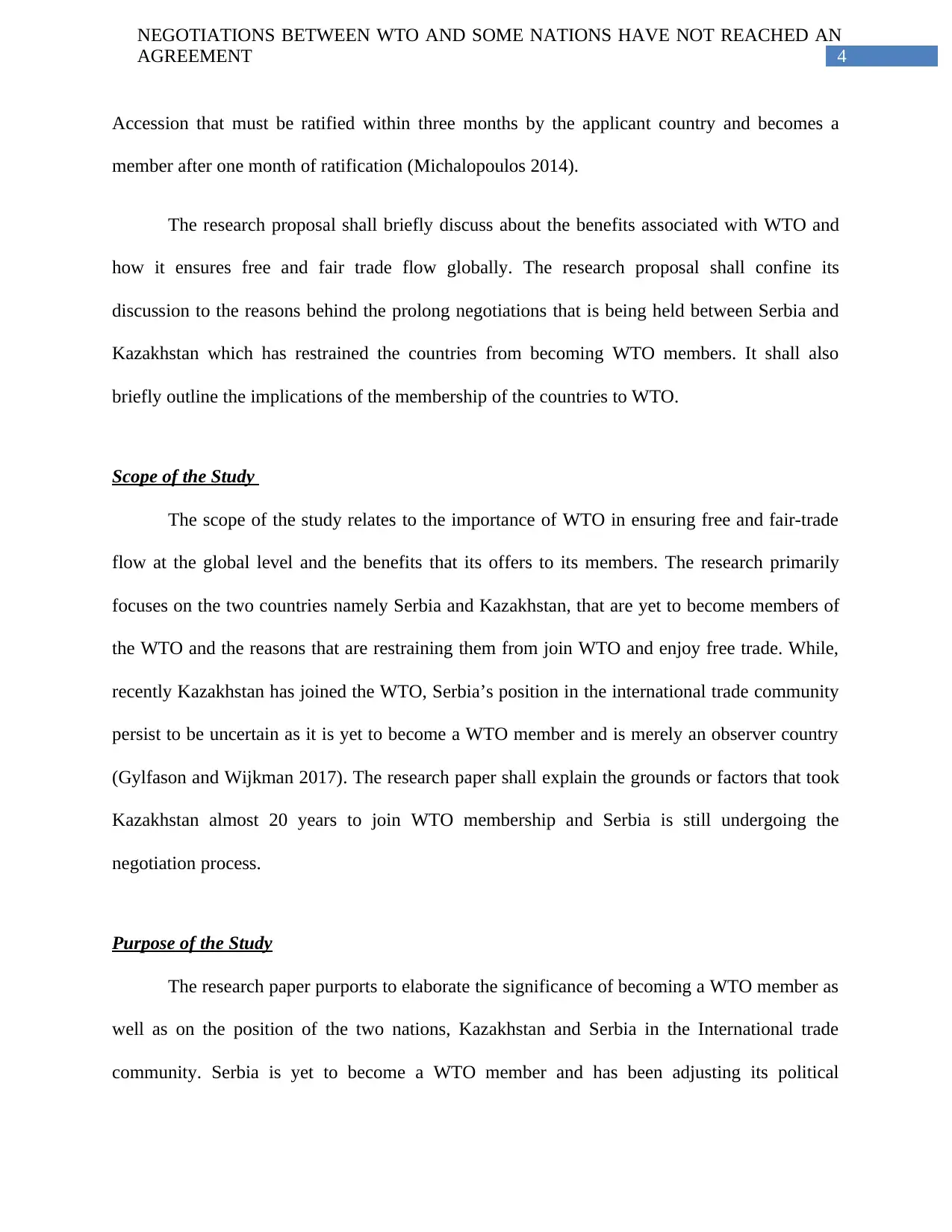
4
NEGOTIATIONS BETWEEN WTO AND SOME NATIONS HAVE NOT REACHED AN
AGREEMENT
Accession that must be ratified within three months by the applicant country and becomes a
member after one month of ratification (Michalopoulos 2014).
The research proposal shall briefly discuss about the benefits associated with WTO and
how it ensures free and fair trade flow globally. The research proposal shall confine its
discussion to the reasons behind the prolong negotiations that is being held between Serbia and
Kazakhstan which has restrained the countries from becoming WTO members. It shall also
briefly outline the implications of the membership of the countries to WTO.
Scope of the Study
The scope of the study relates to the importance of WTO in ensuring free and fair-trade
flow at the global level and the benefits that its offers to its members. The research primarily
focuses on the two countries namely Serbia and Kazakhstan, that are yet to become members of
the WTO and the reasons that are restraining them from join WTO and enjoy free trade. While,
recently Kazakhstan has joined the WTO, Serbia’s position in the international trade community
persist to be uncertain as it is yet to become a WTO member and is merely an observer country
(Gylfason and Wijkman 2017). The research paper shall explain the grounds or factors that took
Kazakhstan almost 20 years to join WTO membership and Serbia is still undergoing the
negotiation process.
Purpose of the Study
The research paper purports to elaborate the significance of becoming a WTO member as
well as on the position of the two nations, Kazakhstan and Serbia in the International trade
community. Serbia is yet to become a WTO member and has been adjusting its political
NEGOTIATIONS BETWEEN WTO AND SOME NATIONS HAVE NOT REACHED AN
AGREEMENT
Accession that must be ratified within three months by the applicant country and becomes a
member after one month of ratification (Michalopoulos 2014).
The research proposal shall briefly discuss about the benefits associated with WTO and
how it ensures free and fair trade flow globally. The research proposal shall confine its
discussion to the reasons behind the prolong negotiations that is being held between Serbia and
Kazakhstan which has restrained the countries from becoming WTO members. It shall also
briefly outline the implications of the membership of the countries to WTO.
Scope of the Study
The scope of the study relates to the importance of WTO in ensuring free and fair-trade
flow at the global level and the benefits that its offers to its members. The research primarily
focuses on the two countries namely Serbia and Kazakhstan, that are yet to become members of
the WTO and the reasons that are restraining them from join WTO and enjoy free trade. While,
recently Kazakhstan has joined the WTO, Serbia’s position in the international trade community
persist to be uncertain as it is yet to become a WTO member and is merely an observer country
(Gylfason and Wijkman 2017). The research paper shall explain the grounds or factors that took
Kazakhstan almost 20 years to join WTO membership and Serbia is still undergoing the
negotiation process.
Purpose of the Study
The research paper purports to elaborate the significance of becoming a WTO member as
well as on the position of the two nations, Kazakhstan and Serbia in the International trade
community. Serbia is yet to become a WTO member and has been adjusting its political
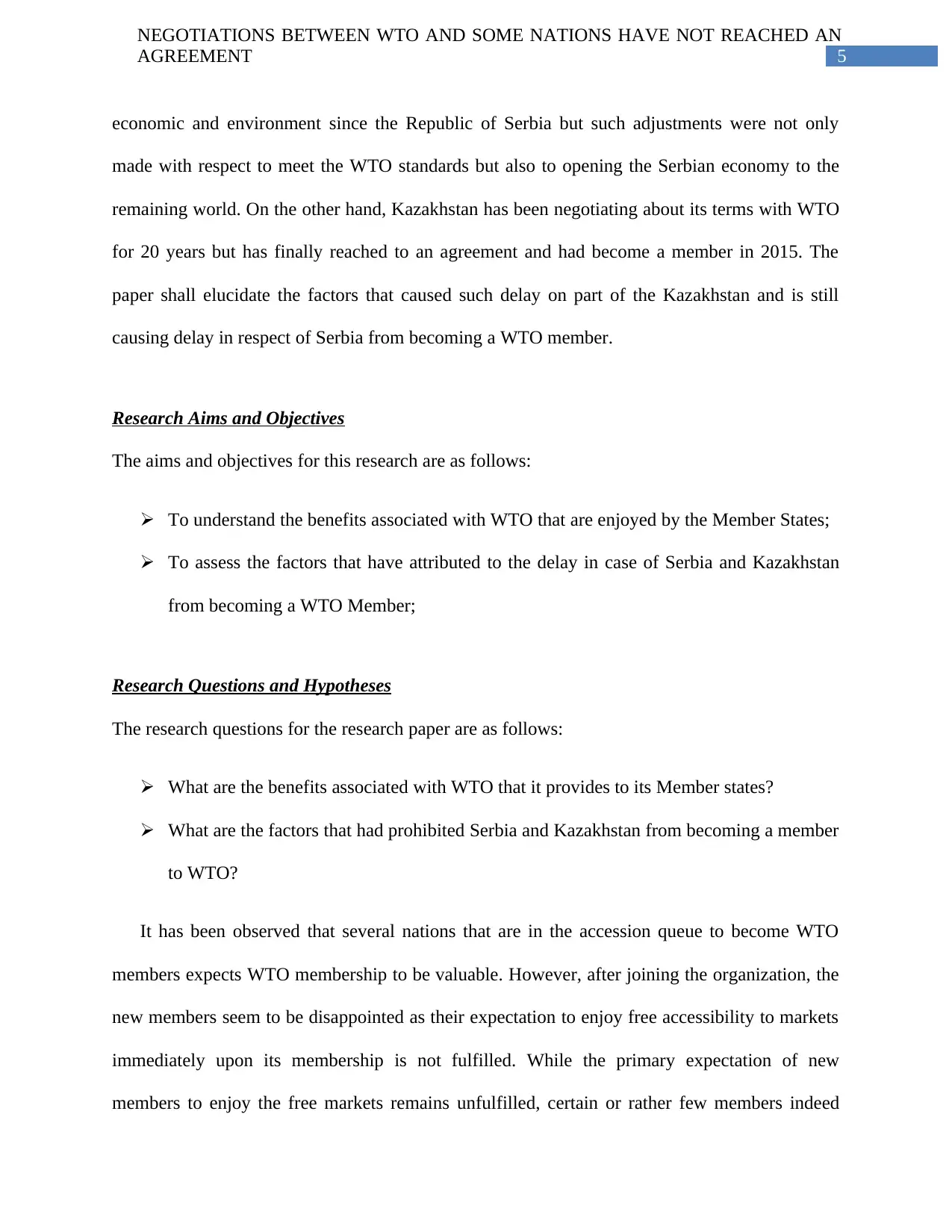
5
NEGOTIATIONS BETWEEN WTO AND SOME NATIONS HAVE NOT REACHED AN
AGREEMENT
economic and environment since the Republic of Serbia but such adjustments were not only
made with respect to meet the WTO standards but also to opening the Serbian economy to the
remaining world. On the other hand, Kazakhstan has been negotiating about its terms with WTO
for 20 years but has finally reached to an agreement and had become a member in 2015. The
paper shall elucidate the factors that caused such delay on part of the Kazakhstan and is still
causing delay in respect of Serbia from becoming a WTO member.
Research Aims and Objectives
The aims and objectives for this research are as follows:
To understand the benefits associated with WTO that are enjoyed by the Member States;
To assess the factors that have attributed to the delay in case of Serbia and Kazakhstan
from becoming a WTO Member;
Research Questions and Hypotheses
The research questions for the research paper are as follows:
What are the benefits associated with WTO that it provides to its Member states?
What are the factors that had prohibited Serbia and Kazakhstan from becoming a member
to WTO?
It has been observed that several nations that are in the accession queue to become WTO
members expects WTO membership to be valuable. However, after joining the organization, the
new members seem to be disappointed as their expectation to enjoy free accessibility to markets
immediately upon its membership is not fulfilled. While the primary expectation of new
members to enjoy the free markets remains unfulfilled, certain or rather few members indeed
NEGOTIATIONS BETWEEN WTO AND SOME NATIONS HAVE NOT REACHED AN
AGREEMENT
economic and environment since the Republic of Serbia but such adjustments were not only
made with respect to meet the WTO standards but also to opening the Serbian economy to the
remaining world. On the other hand, Kazakhstan has been negotiating about its terms with WTO
for 20 years but has finally reached to an agreement and had become a member in 2015. The
paper shall elucidate the factors that caused such delay on part of the Kazakhstan and is still
causing delay in respect of Serbia from becoming a WTO member.
Research Aims and Objectives
The aims and objectives for this research are as follows:
To understand the benefits associated with WTO that are enjoyed by the Member States;
To assess the factors that have attributed to the delay in case of Serbia and Kazakhstan
from becoming a WTO Member;
Research Questions and Hypotheses
The research questions for the research paper are as follows:
What are the benefits associated with WTO that it provides to its Member states?
What are the factors that had prohibited Serbia and Kazakhstan from becoming a member
to WTO?
It has been observed that several nations that are in the accession queue to become WTO
members expects WTO membership to be valuable. However, after joining the organization, the
new members seem to be disappointed as their expectation to enjoy free accessibility to markets
immediately upon its membership is not fulfilled. While the primary expectation of new
members to enjoy the free markets remains unfulfilled, certain or rather few members indeed
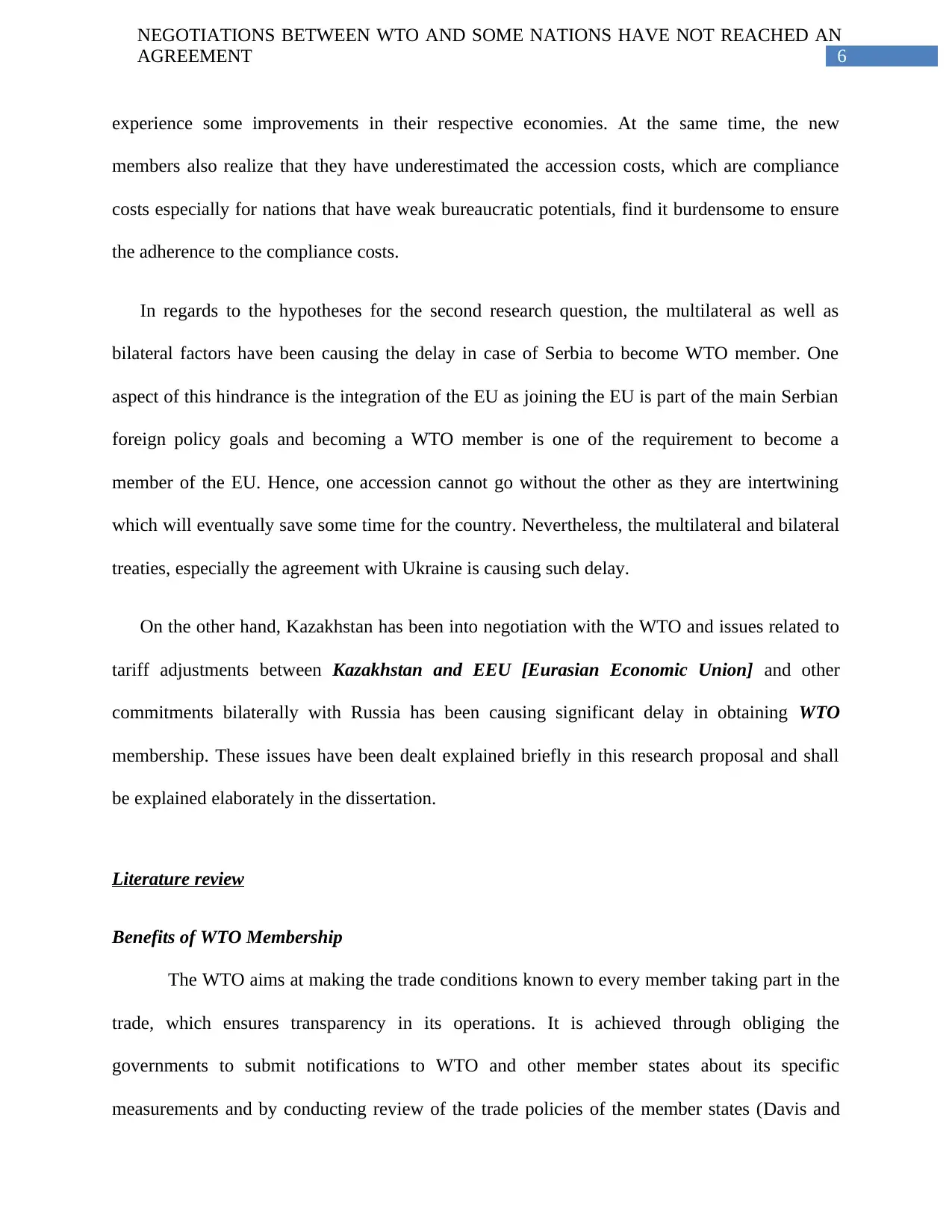
6
NEGOTIATIONS BETWEEN WTO AND SOME NATIONS HAVE NOT REACHED AN
AGREEMENT
experience some improvements in their respective economies. At the same time, the new
members also realize that they have underestimated the accession costs, which are compliance
costs especially for nations that have weak bureaucratic potentials, find it burdensome to ensure
the adherence to the compliance costs.
In regards to the hypotheses for the second research question, the multilateral as well as
bilateral factors have been causing the delay in case of Serbia to become WTO member. One
aspect of this hindrance is the integration of the EU as joining the EU is part of the main Serbian
foreign policy goals and becoming a WTO member is one of the requirement to become a
member of the EU. Hence, one accession cannot go without the other as they are intertwining
which will eventually save some time for the country. Nevertheless, the multilateral and bilateral
treaties, especially the agreement with Ukraine is causing such delay.
On the other hand, Kazakhstan has been into negotiation with the WTO and issues related to
tariff adjustments between Kazakhstan and EEU [Eurasian Economic Union] and other
commitments bilaterally with Russia has been causing significant delay in obtaining WTO
membership. These issues have been dealt explained briefly in this research proposal and shall
be explained elaborately in the dissertation.
Literature review
Benefits of WTO Membership
The WTO aims at making the trade conditions known to every member taking part in the
trade, which ensures transparency in its operations. It is achieved through obliging the
governments to submit notifications to WTO and other member states about its specific
measurements and by conducting review of the trade policies of the member states (Davis and
NEGOTIATIONS BETWEEN WTO AND SOME NATIONS HAVE NOT REACHED AN
AGREEMENT
experience some improvements in their respective economies. At the same time, the new
members also realize that they have underestimated the accession costs, which are compliance
costs especially for nations that have weak bureaucratic potentials, find it burdensome to ensure
the adherence to the compliance costs.
In regards to the hypotheses for the second research question, the multilateral as well as
bilateral factors have been causing the delay in case of Serbia to become WTO member. One
aspect of this hindrance is the integration of the EU as joining the EU is part of the main Serbian
foreign policy goals and becoming a WTO member is one of the requirement to become a
member of the EU. Hence, one accession cannot go without the other as they are intertwining
which will eventually save some time for the country. Nevertheless, the multilateral and bilateral
treaties, especially the agreement with Ukraine is causing such delay.
On the other hand, Kazakhstan has been into negotiation with the WTO and issues related to
tariff adjustments between Kazakhstan and EEU [Eurasian Economic Union] and other
commitments bilaterally with Russia has been causing significant delay in obtaining WTO
membership. These issues have been dealt explained briefly in this research proposal and shall
be explained elaborately in the dissertation.
Literature review
Benefits of WTO Membership
The WTO aims at making the trade conditions known to every member taking part in the
trade, which ensures transparency in its operations. It is achieved through obliging the
governments to submit notifications to WTO and other member states about its specific
measurements and by conducting review of the trade policies of the member states (Davis and
Paraphrase This Document
Need a fresh take? Get an instant paraphrase of this document with our AI Paraphraser
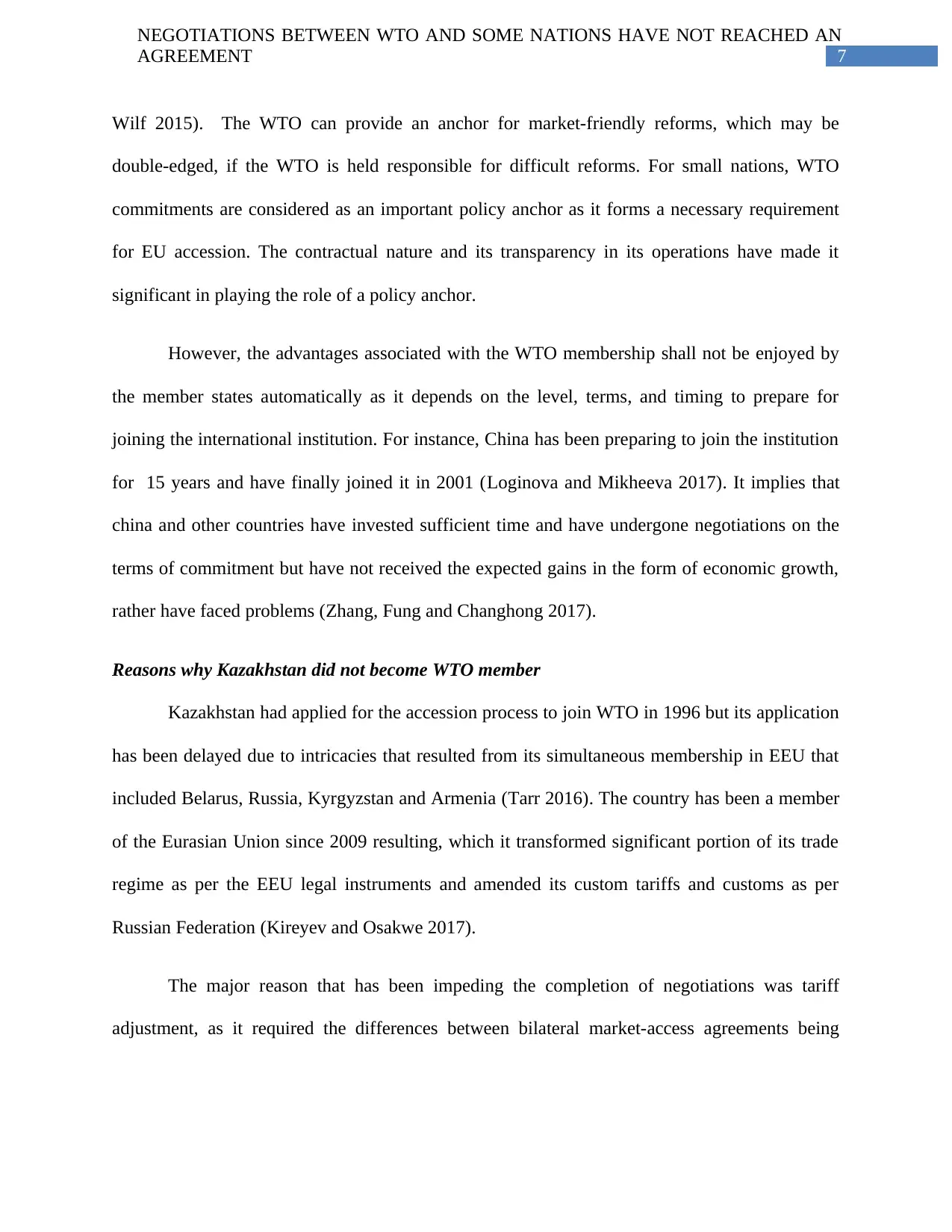
7
NEGOTIATIONS BETWEEN WTO AND SOME NATIONS HAVE NOT REACHED AN
AGREEMENT
Wilf 2015). The WTO can provide an anchor for market-friendly reforms, which may be
double-edged, if the WTO is held responsible for difficult reforms. For small nations, WTO
commitments are considered as an important policy anchor as it forms a necessary requirement
for EU accession. The contractual nature and its transparency in its operations have made it
significant in playing the role of a policy anchor.
However, the advantages associated with the WTO membership shall not be enjoyed by
the member states automatically as it depends on the level, terms, and timing to prepare for
joining the international institution. For instance, China has been preparing to join the institution
for 15 years and have finally joined it in 2001 (Loginova and Mikheeva 2017). It implies that
china and other countries have invested sufficient time and have undergone negotiations on the
terms of commitment but have not received the expected gains in the form of economic growth,
rather have faced problems (Zhang, Fung and Changhong 2017).
Reasons why Kazakhstan did not become WTO member
Kazakhstan had applied for the accession process to join WTO in 1996 but its application
has been delayed due to intricacies that resulted from its simultaneous membership in EEU that
included Belarus, Russia, Kyrgyzstan and Armenia (Tarr 2016). The country has been a member
of the Eurasian Union since 2009 resulting, which it transformed significant portion of its trade
regime as per the EEU legal instruments and amended its custom tariffs and customs as per
Russian Federation (Kireyev and Osakwe 2017).
The major reason that has been impeding the completion of negotiations was tariff
adjustment, as it required the differences between bilateral market-access agreements being
NEGOTIATIONS BETWEEN WTO AND SOME NATIONS HAVE NOT REACHED AN
AGREEMENT
Wilf 2015). The WTO can provide an anchor for market-friendly reforms, which may be
double-edged, if the WTO is held responsible for difficult reforms. For small nations, WTO
commitments are considered as an important policy anchor as it forms a necessary requirement
for EU accession. The contractual nature and its transparency in its operations have made it
significant in playing the role of a policy anchor.
However, the advantages associated with the WTO membership shall not be enjoyed by
the member states automatically as it depends on the level, terms, and timing to prepare for
joining the international institution. For instance, China has been preparing to join the institution
for 15 years and have finally joined it in 2001 (Loginova and Mikheeva 2017). It implies that
china and other countries have invested sufficient time and have undergone negotiations on the
terms of commitment but have not received the expected gains in the form of economic growth,
rather have faced problems (Zhang, Fung and Changhong 2017).
Reasons why Kazakhstan did not become WTO member
Kazakhstan had applied for the accession process to join WTO in 1996 but its application
has been delayed due to intricacies that resulted from its simultaneous membership in EEU that
included Belarus, Russia, Kyrgyzstan and Armenia (Tarr 2016). The country has been a member
of the Eurasian Union since 2009 resulting, which it transformed significant portion of its trade
regime as per the EEU legal instruments and amended its custom tariffs and customs as per
Russian Federation (Kireyev and Osakwe 2017).
The major reason that has been impeding the completion of negotiations was tariff
adjustment, as it required the differences between bilateral market-access agreements being
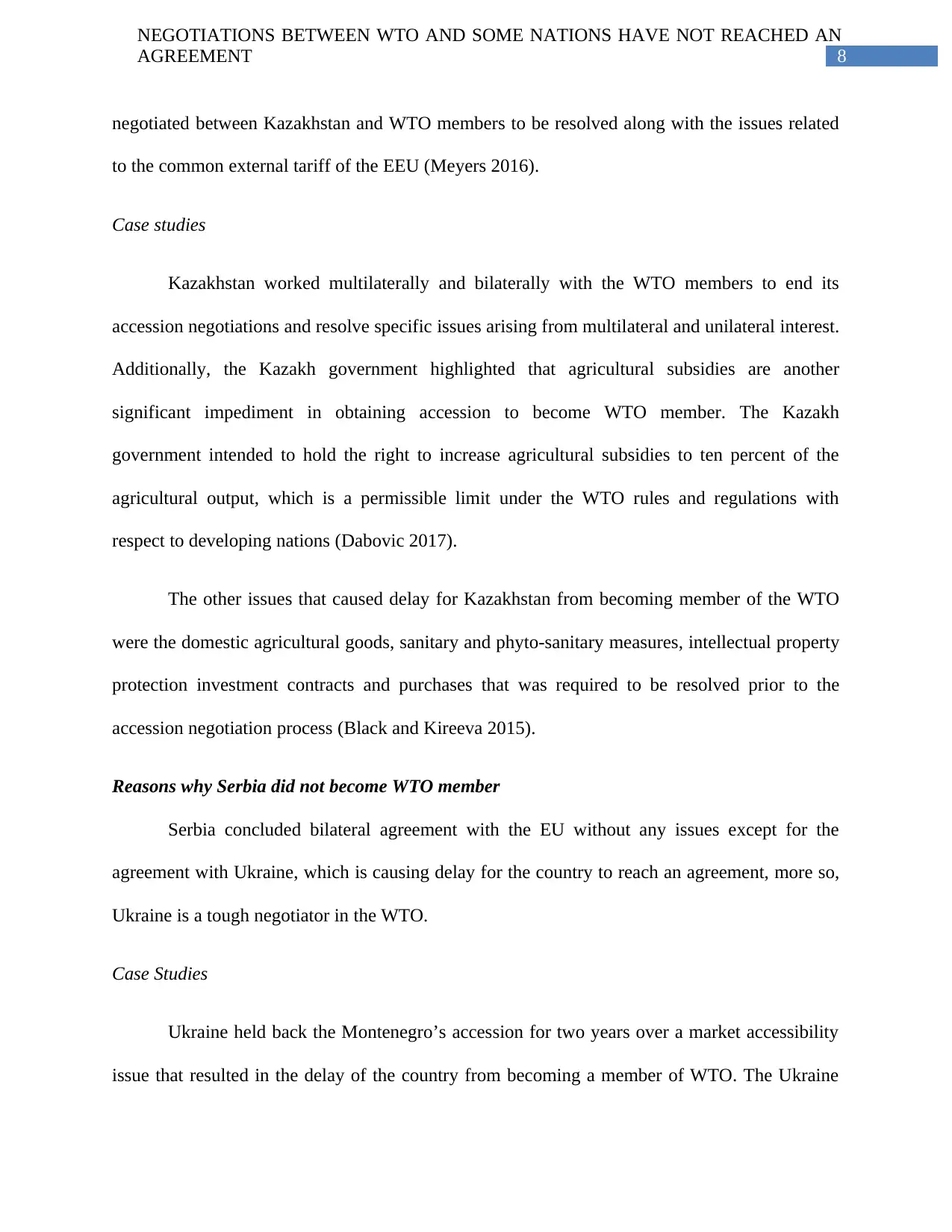
8
NEGOTIATIONS BETWEEN WTO AND SOME NATIONS HAVE NOT REACHED AN
AGREEMENT
negotiated between Kazakhstan and WTO members to be resolved along with the issues related
to the common external tariff of the EEU (Meyers 2016).
Case studies
Kazakhstan worked multilaterally and bilaterally with the WTO members to end its
accession negotiations and resolve specific issues arising from multilateral and unilateral interest.
Additionally, the Kazakh government highlighted that agricultural subsidies are another
significant impediment in obtaining accession to become WTO member. The Kazakh
government intended to hold the right to increase agricultural subsidies to ten percent of the
agricultural output, which is a permissible limit under the WTO rules and regulations with
respect to developing nations (Dabovic 2017).
The other issues that caused delay for Kazakhstan from becoming member of the WTO
were the domestic agricultural goods, sanitary and phyto-sanitary measures, intellectual property
protection investment contracts and purchases that was required to be resolved prior to the
accession negotiation process (Black and Kireeva 2015).
Reasons why Serbia did not become WTO member
Serbia concluded bilateral agreement with the EU without any issues except for the
agreement with Ukraine, which is causing delay for the country to reach an agreement, more so,
Ukraine is a tough negotiator in the WTO.
Case Studies
Ukraine held back the Montenegro’s accession for two years over a market accessibility
issue that resulted in the delay of the country from becoming a member of WTO. The Ukraine
NEGOTIATIONS BETWEEN WTO AND SOME NATIONS HAVE NOT REACHED AN
AGREEMENT
negotiated between Kazakhstan and WTO members to be resolved along with the issues related
to the common external tariff of the EEU (Meyers 2016).
Case studies
Kazakhstan worked multilaterally and bilaterally with the WTO members to end its
accession negotiations and resolve specific issues arising from multilateral and unilateral interest.
Additionally, the Kazakh government highlighted that agricultural subsidies are another
significant impediment in obtaining accession to become WTO member. The Kazakh
government intended to hold the right to increase agricultural subsidies to ten percent of the
agricultural output, which is a permissible limit under the WTO rules and regulations with
respect to developing nations (Dabovic 2017).
The other issues that caused delay for Kazakhstan from becoming member of the WTO
were the domestic agricultural goods, sanitary and phyto-sanitary measures, intellectual property
protection investment contracts and purchases that was required to be resolved prior to the
accession negotiation process (Black and Kireeva 2015).
Reasons why Serbia did not become WTO member
Serbia concluded bilateral agreement with the EU without any issues except for the
agreement with Ukraine, which is causing delay for the country to reach an agreement, more so,
Ukraine is a tough negotiator in the WTO.
Case Studies
Ukraine held back the Montenegro’s accession for two years over a market accessibility
issue that resulted in the delay of the country from becoming a member of WTO. The Ukraine
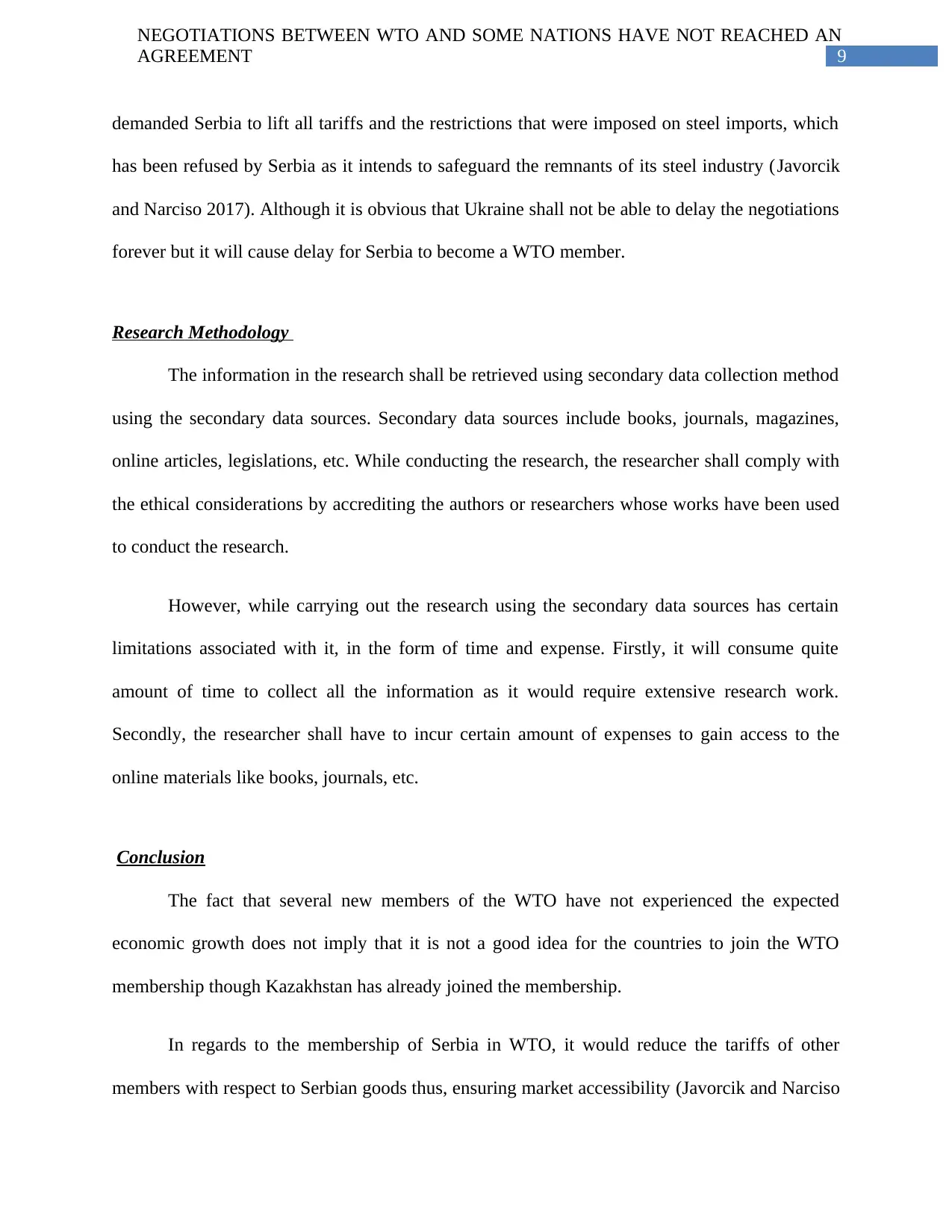
9
NEGOTIATIONS BETWEEN WTO AND SOME NATIONS HAVE NOT REACHED AN
AGREEMENT
demanded Serbia to lift all tariffs and the restrictions that were imposed on steel imports, which
has been refused by Serbia as it intends to safeguard the remnants of its steel industry (Javorcik
and Narciso 2017). Although it is obvious that Ukraine shall not be able to delay the negotiations
forever but it will cause delay for Serbia to become a WTO member.
Research Methodology
The information in the research shall be retrieved using secondary data collection method
using the secondary data sources. Secondary data sources include books, journals, magazines,
online articles, legislations, etc. While conducting the research, the researcher shall comply with
the ethical considerations by accrediting the authors or researchers whose works have been used
to conduct the research.
However, while carrying out the research using the secondary data sources has certain
limitations associated with it, in the form of time and expense. Firstly, it will consume quite
amount of time to collect all the information as it would require extensive research work.
Secondly, the researcher shall have to incur certain amount of expenses to gain access to the
online materials like books, journals, etc.
Conclusion
The fact that several new members of the WTO have not experienced the expected
economic growth does not imply that it is not a good idea for the countries to join the WTO
membership though Kazakhstan has already joined the membership.
In regards to the membership of Serbia in WTO, it would reduce the tariffs of other
members with respect to Serbian goods thus, ensuring market accessibility (Javorcik and Narciso
NEGOTIATIONS BETWEEN WTO AND SOME NATIONS HAVE NOT REACHED AN
AGREEMENT
demanded Serbia to lift all tariffs and the restrictions that were imposed on steel imports, which
has been refused by Serbia as it intends to safeguard the remnants of its steel industry (Javorcik
and Narciso 2017). Although it is obvious that Ukraine shall not be able to delay the negotiations
forever but it will cause delay for Serbia to become a WTO member.
Research Methodology
The information in the research shall be retrieved using secondary data collection method
using the secondary data sources. Secondary data sources include books, journals, magazines,
online articles, legislations, etc. While conducting the research, the researcher shall comply with
the ethical considerations by accrediting the authors or researchers whose works have been used
to conduct the research.
However, while carrying out the research using the secondary data sources has certain
limitations associated with it, in the form of time and expense. Firstly, it will consume quite
amount of time to collect all the information as it would require extensive research work.
Secondly, the researcher shall have to incur certain amount of expenses to gain access to the
online materials like books, journals, etc.
Conclusion
The fact that several new members of the WTO have not experienced the expected
economic growth does not imply that it is not a good idea for the countries to join the WTO
membership though Kazakhstan has already joined the membership.
In regards to the membership of Serbia in WTO, it would reduce the tariffs of other
members with respect to Serbian goods thus, ensuring market accessibility (Javorcik and Narciso
Secure Best Marks with AI Grader
Need help grading? Try our AI Grader for instant feedback on your assignments.
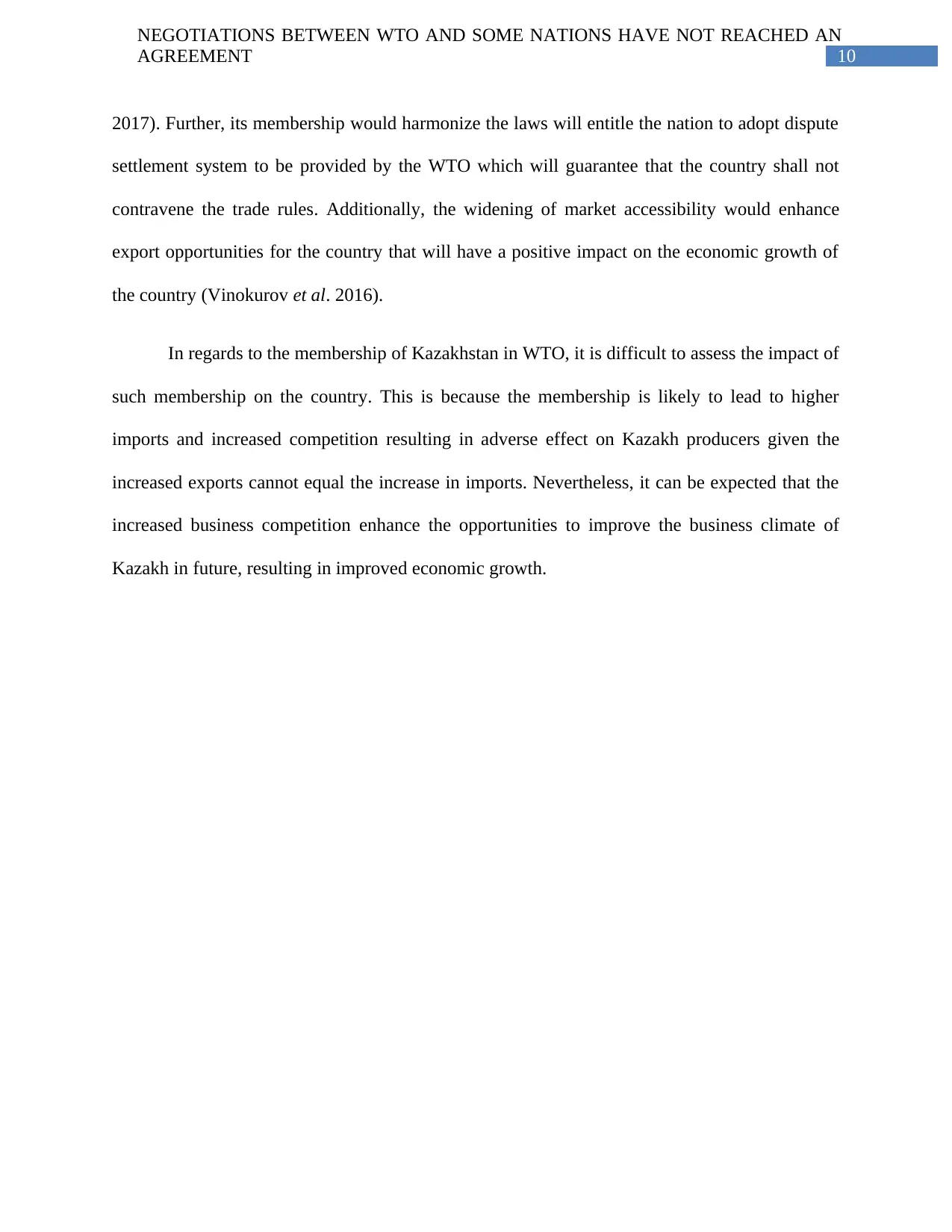
10
NEGOTIATIONS BETWEEN WTO AND SOME NATIONS HAVE NOT REACHED AN
AGREEMENT
2017). Further, its membership would harmonize the laws will entitle the nation to adopt dispute
settlement system to be provided by the WTO which will guarantee that the country shall not
contravene the trade rules. Additionally, the widening of market accessibility would enhance
export opportunities for the country that will have a positive impact on the economic growth of
the country (Vinokurov et al. 2016).
In regards to the membership of Kazakhstan in WTO, it is difficult to assess the impact of
such membership on the country. This is because the membership is likely to lead to higher
imports and increased competition resulting in adverse effect on Kazakh producers given the
increased exports cannot equal the increase in imports. Nevertheless, it can be expected that the
increased business competition enhance the opportunities to improve the business climate of
Kazakh in future, resulting in improved economic growth.
NEGOTIATIONS BETWEEN WTO AND SOME NATIONS HAVE NOT REACHED AN
AGREEMENT
2017). Further, its membership would harmonize the laws will entitle the nation to adopt dispute
settlement system to be provided by the WTO which will guarantee that the country shall not
contravene the trade rules. Additionally, the widening of market accessibility would enhance
export opportunities for the country that will have a positive impact on the economic growth of
the country (Vinokurov et al. 2016).
In regards to the membership of Kazakhstan in WTO, it is difficult to assess the impact of
such membership on the country. This is because the membership is likely to lead to higher
imports and increased competition resulting in adverse effect on Kazakh producers given the
increased exports cannot equal the increase in imports. Nevertheless, it can be expected that the
increased business competition enhance the opportunities to improve the business climate of
Kazakh in future, resulting in improved economic growth.
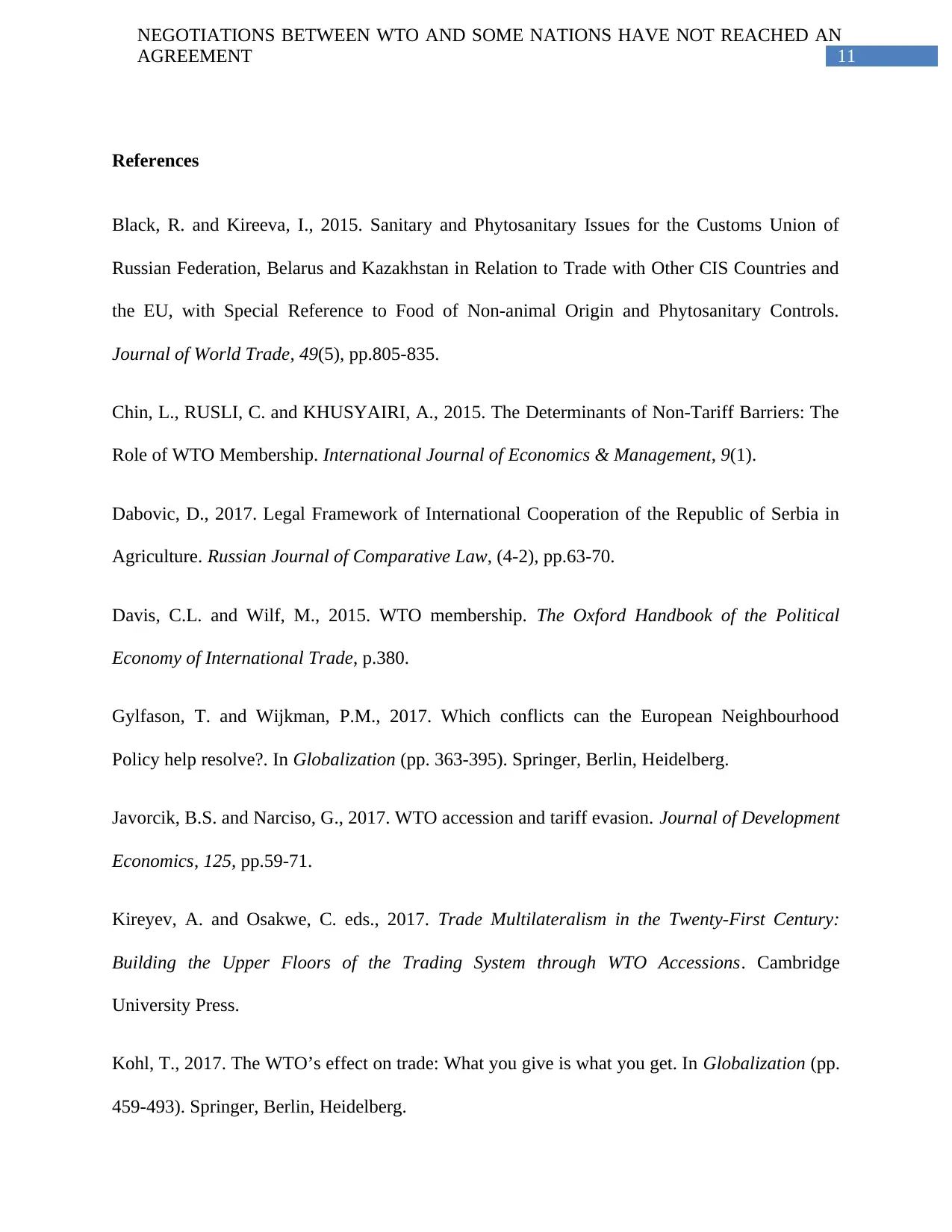
11
NEGOTIATIONS BETWEEN WTO AND SOME NATIONS HAVE NOT REACHED AN
AGREEMENT
References
Black, R. and Kireeva, I., 2015. Sanitary and Phytosanitary Issues for the Customs Union of
Russian Federation, Belarus and Kazakhstan in Relation to Trade with Other CIS Countries and
the EU, with Special Reference to Food of Non-animal Origin and Phytosanitary Controls.
Journal of World Trade, 49(5), pp.805-835.
Chin, L., RUSLI, C. and KHUSYAIRI, A., 2015. The Determinants of Non-Tariff Barriers: The
Role of WTO Membership. International Journal of Economics & Management, 9(1).
Dabovic, D., 2017. Legal Framework of International Cooperation of the Republic of Serbia in
Agriculture. Russian Journal of Comparative Law, (4-2), pp.63-70.
Davis, C.L. and Wilf, M., 2015. WTO membership. The Oxford Handbook of the Political
Economy of International Trade, p.380.
Gylfason, T. and Wijkman, P.M., 2017. Which conflicts can the European Neighbourhood
Policy help resolve?. In Globalization (pp. 363-395). Springer, Berlin, Heidelberg.
Javorcik, B.S. and Narciso, G., 2017. WTO accession and tariff evasion. Journal of Development
Economics, 125, pp.59-71.
Kireyev, A. and Osakwe, C. eds., 2017. Trade Multilateralism in the Twenty-First Century:
Building the Upper Floors of the Trading System through WTO Accessions. Cambridge
University Press.
Kohl, T., 2017. The WTO’s effect on trade: What you give is what you get. In Globalization (pp.
459-493). Springer, Berlin, Heidelberg.
NEGOTIATIONS BETWEEN WTO AND SOME NATIONS HAVE NOT REACHED AN
AGREEMENT
References
Black, R. and Kireeva, I., 2015. Sanitary and Phytosanitary Issues for the Customs Union of
Russian Federation, Belarus and Kazakhstan in Relation to Trade with Other CIS Countries and
the EU, with Special Reference to Food of Non-animal Origin and Phytosanitary Controls.
Journal of World Trade, 49(5), pp.805-835.
Chin, L., RUSLI, C. and KHUSYAIRI, A., 2015. The Determinants of Non-Tariff Barriers: The
Role of WTO Membership. International Journal of Economics & Management, 9(1).
Dabovic, D., 2017. Legal Framework of International Cooperation of the Republic of Serbia in
Agriculture. Russian Journal of Comparative Law, (4-2), pp.63-70.
Davis, C.L. and Wilf, M., 2015. WTO membership. The Oxford Handbook of the Political
Economy of International Trade, p.380.
Gylfason, T. and Wijkman, P.M., 2017. Which conflicts can the European Neighbourhood
Policy help resolve?. In Globalization (pp. 363-395). Springer, Berlin, Heidelberg.
Javorcik, B.S. and Narciso, G., 2017. WTO accession and tariff evasion. Journal of Development
Economics, 125, pp.59-71.
Kireyev, A. and Osakwe, C. eds., 2017. Trade Multilateralism in the Twenty-First Century:
Building the Upper Floors of the Trading System through WTO Accessions. Cambridge
University Press.
Kohl, T., 2017. The WTO’s effect on trade: What you give is what you get. In Globalization (pp.
459-493). Springer, Berlin, Heidelberg.
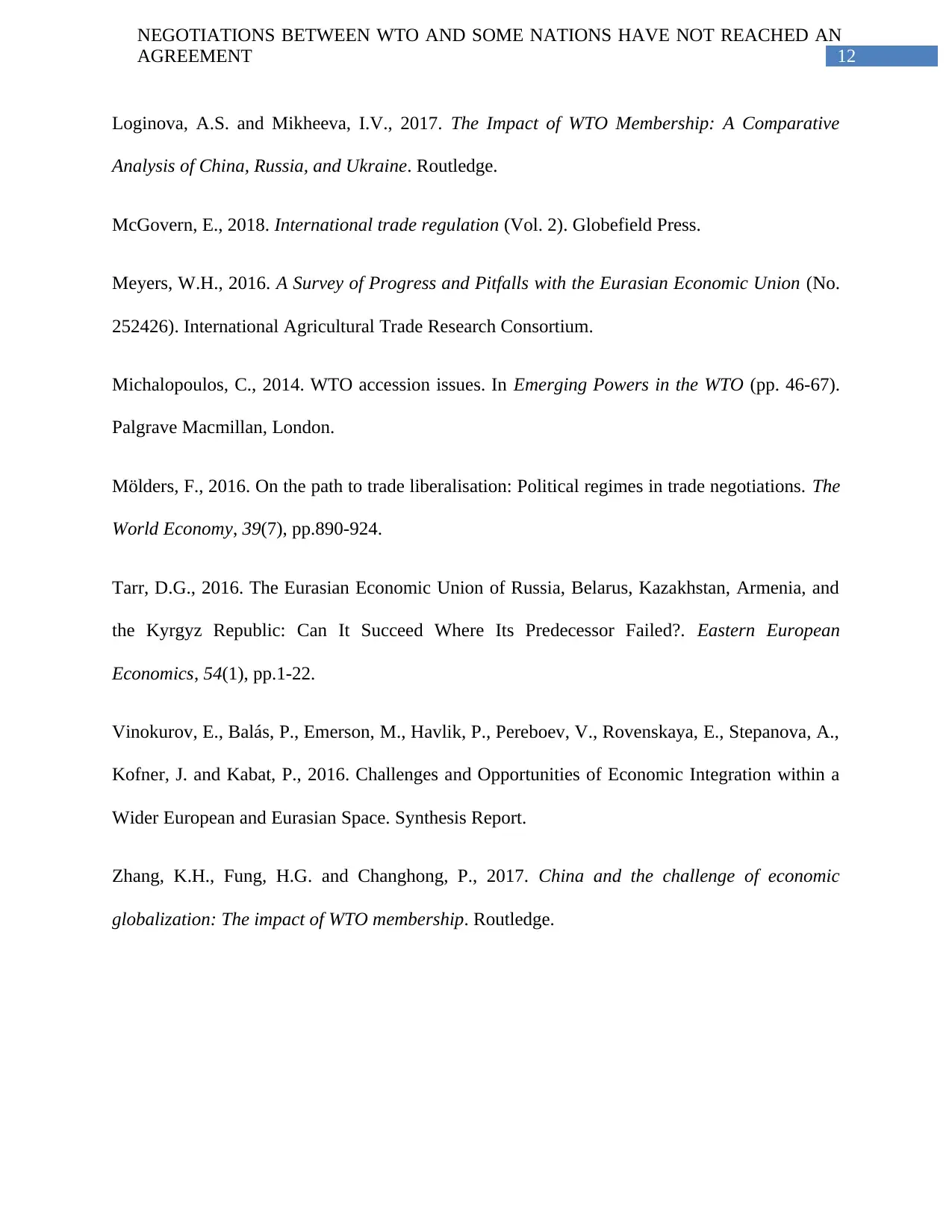
12
NEGOTIATIONS BETWEEN WTO AND SOME NATIONS HAVE NOT REACHED AN
AGREEMENT
Loginova, A.S. and Mikheeva, I.V., 2017. The Impact of WTO Membership: A Comparative
Analysis of China, Russia, and Ukraine. Routledge.
McGovern, E., 2018. International trade regulation (Vol. 2). Globefield Press.
Meyers, W.H., 2016. A Survey of Progress and Pitfalls with the Eurasian Economic Union (No.
252426). International Agricultural Trade Research Consortium.
Michalopoulos, C., 2014. WTO accession issues. In Emerging Powers in the WTO (pp. 46-67).
Palgrave Macmillan, London.
Mölders, F., 2016. On the path to trade liberalisation: Political regimes in trade negotiations. The
World Economy, 39(7), pp.890-924.
Tarr, D.G., 2016. The Eurasian Economic Union of Russia, Belarus, Kazakhstan, Armenia, and
the Kyrgyz Republic: Can It Succeed Where Its Predecessor Failed?. Eastern European
Economics, 54(1), pp.1-22.
Vinokurov, E., Balás, P., Emerson, M., Havlik, P., Pereboev, V., Rovenskaya, E., Stepanova, A.,
Kofner, J. and Kabat, P., 2016. Challenges and Opportunities of Economic Integration within a
Wider European and Eurasian Space. Synthesis Report.
Zhang, K.H., Fung, H.G. and Changhong, P., 2017. China and the challenge of economic
globalization: The impact of WTO membership. Routledge.
NEGOTIATIONS BETWEEN WTO AND SOME NATIONS HAVE NOT REACHED AN
AGREEMENT
Loginova, A.S. and Mikheeva, I.V., 2017. The Impact of WTO Membership: A Comparative
Analysis of China, Russia, and Ukraine. Routledge.
McGovern, E., 2018. International trade regulation (Vol. 2). Globefield Press.
Meyers, W.H., 2016. A Survey of Progress and Pitfalls with the Eurasian Economic Union (No.
252426). International Agricultural Trade Research Consortium.
Michalopoulos, C., 2014. WTO accession issues. In Emerging Powers in the WTO (pp. 46-67).
Palgrave Macmillan, London.
Mölders, F., 2016. On the path to trade liberalisation: Political regimes in trade negotiations. The
World Economy, 39(7), pp.890-924.
Tarr, D.G., 2016. The Eurasian Economic Union of Russia, Belarus, Kazakhstan, Armenia, and
the Kyrgyz Republic: Can It Succeed Where Its Predecessor Failed?. Eastern European
Economics, 54(1), pp.1-22.
Vinokurov, E., Balás, P., Emerson, M., Havlik, P., Pereboev, V., Rovenskaya, E., Stepanova, A.,
Kofner, J. and Kabat, P., 2016. Challenges and Opportunities of Economic Integration within a
Wider European and Eurasian Space. Synthesis Report.
Zhang, K.H., Fung, H.G. and Changhong, P., 2017. China and the challenge of economic
globalization: The impact of WTO membership. Routledge.
1 out of 13
Related Documents
Your All-in-One AI-Powered Toolkit for Academic Success.
+13062052269
info@desklib.com
Available 24*7 on WhatsApp / Email
![[object Object]](/_next/static/media/star-bottom.7253800d.svg)
Unlock your academic potential
© 2024 | Zucol Services PVT LTD | All rights reserved.





